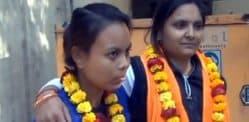"They come on different days, they have their turns"
India’s women are being forced to marry multiple husbands to combat the country’s “wife shortage”.
Uttar Pradesh’s Baghpat district is considered to be the core of India’s gender imbalance crisis that the United Nations warned in 2014 had reached “emergency proportions”.
According to the Indian government census in 2011, a preference for sons over daughters meant that there were only 856 females to 1,000 males in Baghpat.
Dr Neelam Singh, who runs Vatsalya, an NGO which combats female foeticide in Uttar Pradesh, explained that since then, the gap has widened.
Dr Singh said: “When the 2021 census is published we believe [it will show] sex ratios have declined further and fast.”
Devendra Dhama, of NGO Navodya Lok Chetna Kalyan Samiti, added:
“In our region, especially in middle and lower-class families, if you go to houses you’ll notice that you don’t see any girls there.”
His research discovered that the ratio has widened. It is now 700 females to 1,000 males.
Sex selection of foetuses and abortion of babies because of their gender is illegal under Indian law.
But, it is so common that men from poor families in Baghpat are now unable to find brides to marry.
Instead, brides are purchased from poor families outside of Uttar Pradesh. They may officially get married to one man but they are expected to act as a wife to several others in what is known as polyandry.
Mr Dhama believes the practice has increased since 2011 because sex ratios have significantly widened.
He is aware that approximately 2,100 women in the district are engaged in the practice. He also said most are physically and sexually abused.
One person who has experienced that since her wedding day is Maajida*.

She was born in Uttarakhand and her parents sold ice-cream to make a living, but it was not enough to feed their children.
They believed that by marrying her off she would have a better life.
At the age of 17, she was married off to a lorry driver living in Uttar Pradesh. However, her husband’s family could not find brides for their other sons due to the “wife shortage”.
Maajida soon acted as a bride to her husband’s two older brothers, unbeknown to her and her family. When she refused, she would be raped and beaten.
She told the Telegraph: “They come on different days, they have their turns, they have their days.”
Maajida has given birth to two children but does not know which of the brothers is the father.
Her family know about the abuse but do not have the money to escalate a police report they have lodged. They have to pay for an investigation as they live in a different state.
Maajida says she knows of several others in similar situations.
ActionAid India programme manager Khalid Chaudhry said:
“The practice of polyandrous marriages with brides from other states is prevalent in the western part of Uttar Pradesh.
“The women’s condition in these marriages is one of extreme vulnerability and insecurity.”
“Their treatment is like that of a slave, living under the real threat of rape, which as per law is not considered a crime when it happens within marriage.”

Within Indian society, there is a preference for sons over daughters.
Twenty-two-year-old Manik is from Baghpat explained that he and his brothers are struggling to find a wife.
He said: “People feel it is very expensive to bring up a daughter.
“They will have to spend on their education, food, clothing and marriage and the girl will just eventually go away to another family.”
The increasing gap in gender ratio is down to sex-selection IVF procedures and abortions becoming cheaper.
Mr Chaudhry stated that the practice is illegal. He added:
“Yet, there are many ultrasound centres and fertility clinics which help individuals in determining the sex of the foetus and facilitating the subsequent elimination of the birth of girl children by aborting the female foetus.
“Availability of cheap technology but most of all complicity of the authorities has allowed this flourishing illegal practice to permeate into rural areas as well, turning this into a national crisis.”
A communication campaign called ‘Beti Bachao, Beti Padhao’ was introduced by the Indian Government in 2015 which aimed to “change people’s mindsets towards the girl child”.
It was a success in Haryana as the government threatened to prosecute those offering illegal abortions. However, not much attention is being paid in Baghpat.
Dr Singh said: “The government has not really taken the threat seriously.
“I approached the speaker of the house and said I want to let the politicians know about the situation but they are non-responsive, they didn’t give me the time, these statutory bodies have an unwillingness to deal with the issue.”
Mr Dhama stated that the local government committee is corrupt and has stopped doing its job.
In the city of Khekra, the scale of illegal abortion is huge. The streets are filled with clinics which offer illegal procedures for Rs. 1,500 (£17).
There are also pop-up pharmacies that sell instant abortion tablets for just Rs. 100 (£1.15).
Dr Singh explained: “Initially it was demand-driven supply but now it is supply-driven demand.”
According to data collected by the Indian Government, in 132 villages in Uttarakhand, no girls were born between May and July 2019, compared to 200 boys.
According to a marriage agent near Meerut, the police unlawfully allow polyandrous marriages.
He is paid Rs. 20,000 (£240) to find bride, some as young as 15, for families in Baghpat for multiple sons.
He explained that the police in Assam are aware but will allow it for a bribe of up to Rs. 5,000 (£60).
The marriage agent said: “There is a shortage of girls here.
“Men can only marry girls if they are educated and if they have jobs, so these extra men marry girls from outside the state.
“Polyandry is very common here, every second, third or fourth house.”
Shakuntala* is another woman who was forced to marry multiple brothers. She said:
“We would fight a lot, he would hit me really bad.
“The older brother would try to make me characterless by forcing himself on me.”
Shakuntala was freed from the marriage in 2010 when her husband died.
But she is worried that young girls in her village will end up in polyandrous marriages in the future.
She added: “It is very prevalent and it is increasing.
“If you keep killing girls inside the wombs then where will all these unmarried boys go?”
Maajida hopes that she will be free from her marriage but believes it is unlikely as they have no way of raising the necessary funds.
She asked her husband and brothers-in-law: “I just want to ask them why are you raping me?”
Polyandrous marriages in Baghpat, India continue to increase as a result of sex-selective abortions even though they are illegal.





























































